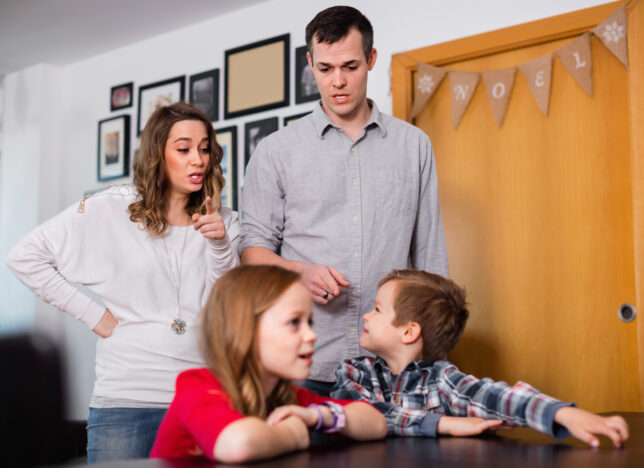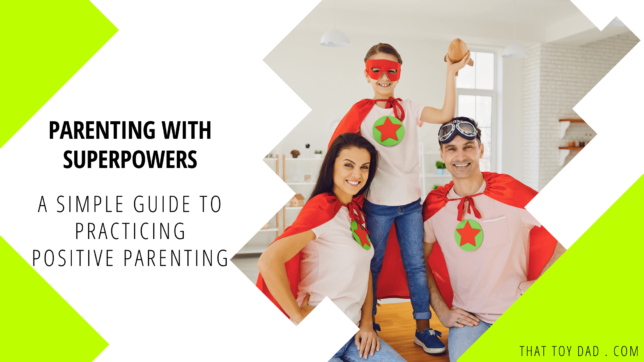Parenting doesn’t have to all be about toddler meltdowns, bedtime battles, sibling rivalry, mealtime clashes, and homework struggles! It’s just a case of knowing how to practice positive parenting. But what exactly is that? In this article, I’m going to share with you the basic principles with a helpful Positive Parenting Guide.
A Positive Parenting Guide
If you’re wondering how I discovered positive parenting, it was really through a desire to be a better Dad. When my first child was born, like most new parents, I really had no idea what I was doing. My only compass was how my own parents had brought me up.
I became a stay-at-home Dad and my children’s primary care provider. In this role, I wanted to be sure I was doing the very best I could for my kids. Like most other Moms and Dads, I’d often find myself tired and frustrated and sometimes yelling when Benni misbehaved. I hated myself for it, and I knew there had to be a better way, but heck, I didn’t have any superpowers, so what could I do differently?
After a lot of searching, I stumbled on a fantastic online course that literally changed our entire family life. After only a few days of following its principles, my relationship with my son was a lot better than ever before.
In fact, our entire family unit was happier, and I didn’t feel the need to yell anymore. I’ll share more information about the course I took later, but for now, let’s dive into my positive parenting guide to raising happy, healthy kids.

The 8 Basic Principals of the Positive Parenting Guide
Firstly, there’s one thing that’s really important to remember, no parent is ever perfect. We all make mistakes, we’re human, and it just comes with the territory.
What helps us become better parents, however, is the ability to recognize when things are going sideways. Instead of responding to your child with hostility, we use empathy, understanding, respect, and above all – love.
1. Building Strong Connections
To use positive parenting effectively, you first need to create a strong bond with your child. This isn’t something that happens by accident, and it takes work and patience. Attachment comes naturally for your child; they’ve been reliant on you from birth and depend on you for all their basic needs.
Attachment bond theory is about how a powerful, trusting connection is created between you and your children. It directly affects their ability to regulate emotions, thoughts, and desires. As they grow older, the strength of these bonds translates to the connection they have with you, and those they make in their own future relationships.
Failure to create strong positive attachments during childhood can result in behavioral and relationship problems later on. A child who has a strong bond to their parents naturally wishes to please them and make them proud. You can read more about this fascinating topic here.
2. Emotions
As adults, we know what a rollercoaster emotions can be. We can recognize an emotional response to a situation and understand why we feel them – anger, hurt, fear, desire, and so on. Young children don’t have the ability to recognize their emotions and have no way to manage them.
When you’re busy or feeling tired or stressed, it can be easy to allow your emotions to get the better of you and react instinctively without any forethought. Instead, it’s necessary to think about how our child feels and look at why they have misbehaved.
Ask yourself, are they tired, hungry, in need of some attention? This is a vital component to my positive parenting guide – remember, as the adult, we have to be understanding of how our child is feeling, rather than allowing the way we feel get the better of us.
Shouting, inflicting psychological punishments, smacking, etc., do not make any situation better. Staying calm, practicing patience, emotional empathy, and understanding will get the results we desire.

Recognize that your child is your mirror. If you treat them with aggression, they will do the same back to you, only escalating the problem. They also learn that this is how to treat others. When children are in an aggravated state of mind, you cannot teach them anything, so they will likely repeat the same behavior again. By defusing the situation and being calm, the child will eventually be calm too, it is then that you teach them the correct way to behave.
3. Treat Them With Respect
Children are people, too. Sometimes we forget this and that they are not just another of our possessions. Kids deserve to be respected just as you would respect your boss, your Mom, your partner, and so on.
By showing your child you respect them, you teach them to respect you in return (remember the mirror?). Being loving and nurturing actually affects the way your child’s brain develops.
Studies have shown that children who are loved and respected learn better, remember more and suffer from less stress.
4. Together Time
Kids crave the attention of their parents, it’s literally hard-wired into them. By giving them the together time they need, and giving your focus entirely to them, has been shown to have a significant effect on behavior.
Babies need the attention of an adult 24/7, but it can sometimes be a bit one-sided, with moms doing the majority of the work. If you’re a Dad, do something to address this balance. Ensure you also get to spend quality time with your little one, you’ll both benefit, and your partner will appreciate the help too!
As your baby gets older, this together time remains just as important. Make space in your schedule every day (no matter how busy) to ensure your child feels special. Let them know how much you love them, be interested, and take part in their activities.

5. Setting Boundaries and Consequences
Practicing positive parenting doesn’t mean your child goes without discipline or age-appropriate guidelines. It remains important to teach your kids about rules and how they must respect them.
Children like to know what the boundaries are, and having daily routines lets them make sense of the world and makes them feel safe. It also makes your life easier.
Discipline is not the same as punishment. In positive parenting, you never punish a child, only discipline them. First, consider why they are being naughty, then, work on teaching your child what they did wrong and how to do better in the future. They naturally want to please you. So let them know how to do that.
It’s essential to remove the cause of the problem, so whatever triggered the behavior needs to be dealt with, or you can gently take your child out of the environment and use distraction techniques. Before you start, give them time to calm down first before you both figure out how they can behave differently next time.
6. Intervention
If there is any kind of physical risk, such as a child biting or hitting another, you need to intervene and remove the child gently from the situation immediately.
Step in right away, so you prevent further harm. Once you’ve calmed the child, create a teaching moment. Show them how their behavior was incorrect and how to approach it in a better way in the future.
7. Positivity not Negativity
Positive parenting requires you as a parent to be positive, so using the word NO is not the best way to do things. For starters, try saying YES more often.
By redirecting negative behavior into something positive, you can teach your child the right way to do things:
- Show by example – “Let’s pick up the toys.”
- Use distraction techniques – Not “Don’t do that!” but “Let’s do this.”
- Keep connections strong – Show your kid how much you care about them, be interested in what they’re doing, their opinion, what they have to say. Read bedtime stories, ask them about their day. Not only will they enjoy telling you, but it helps you discover if there are any problems you need to be aware of. Keeping a free, easy, and open line of communication allows your child to know they can come to you if ever they need help.
8. Empathy Not Authority
There is a misconception about positive parenting – some people believe a positive parent allows their child to do as they please. This is not the case. A parent should be seen as a leader, someone to guide, solve problems, and make the right choices.
But as that leader, you must show empathy. Understand your children’s needs and let them know you are connected and aware, so they feel understood.

Conclusion
The bottom line to my positive parenting guide is to approach life with love, empathy, and kindness towards your children.
- Never try forcing your rules by using punishment, shouting, or belittling.
- Hostile parenting only leads to power struggles from which there is no winner, only losers.
- Remember, your child is your mirror. They will show you how you treat them by treating you and others the same way.
- Guide your children actively towards better behavior. Teach them how to solve problems on their own and become happy, independent adults capable of forming strong and loving relationships with others.
As I said at the beginning, I learned how to achieve positive parenting by taking a truly brilliant online course. I love it, and I recommend it to all of my friends, whenever I get the chance to do so 🙂
To learn more about positive parenting yourself, and to create a more fulfilled, happy family, take a look at my full review of Positive Parenting Solutions here.
I hope you’ve found this guide to positive parenting interesting and find my tips useful. If you have any questions or would like to add to the story, please let’s discuss in the comment section below. I’m eager to read your thoughts on the topic: What does work well for you? And what doesn’t?
All the best,
chris
P.S.: If you REALLY want to level up your parenting skills and get rid of all the power struggles that can stand between our kids and us as moms or dads, then make sure to read my FULL REVIEW of “Positive Parenting Solutions” HERE.

